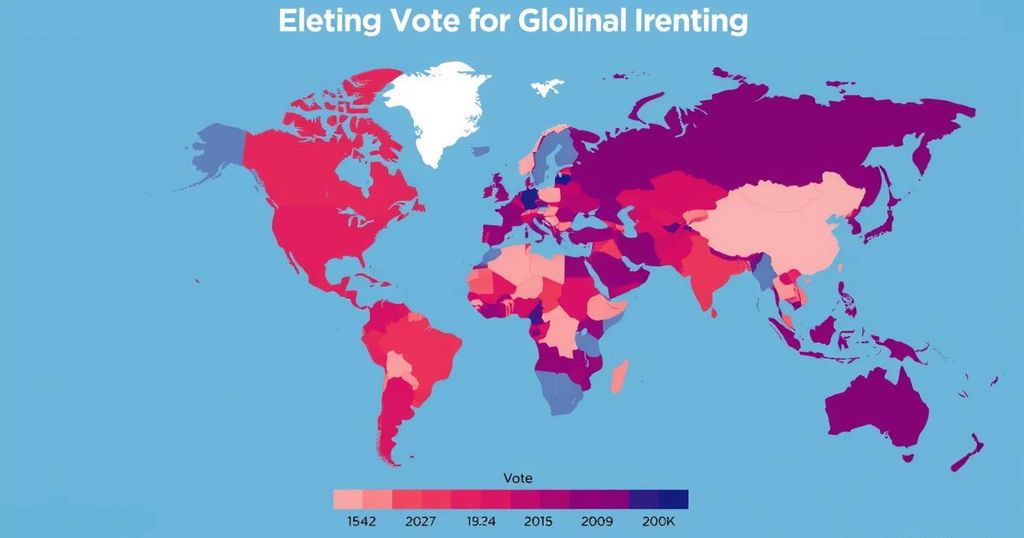Global Electoral Landscape: Insights from the 2024 Elections

The 2024 elections held across more than 70 countries saw a 61 percent global voter turnout. India led with the largest democratic exercise, while Donald Trump returned as U.S. president. Rwanda achieved high turnout, contrasting with Tunisia’s low engagement. Several incumbents maintained power, but significant political changes occurred in nations like Bangladesh and Botswana, indicating a global shift in governance.
In 2024, elections took place in over 70 countries worldwide, impacting approximately half the planet’s population. Among these elections, significant participation occurred within the European Union, where 27 member states voted in parliamentary elections. The global voter turnout averaged 61 percent, with notable disparities across nations: Rwanda recorded an impressive 98.2 percent turnout while Tunisia faced a mere 28.8 percent. Major elections unfolded in populous nations such as India, the United States, and Indonesia, shaping their political landscapes significantly.
India, hosting the largest democratic process with over 637 million voters, saw the ruling Bharatiya Janata Party (BJP) led by Prime Minister Narendra Modi struggle to maintain a parliamentary majority after a decade in power. Meanwhile, Donald Trump reemerged as the victor in the polarised US elections against Vice President Kamala Harris, capturing over 77 million votes. In Indonesia, Prabowo Subianto claimed the presidency with 59 percent of the vote, succeeding outgoing President Joko Widodo.
The election results varied significantly across the globe, with several incumbent leaders retaining power while facing reduced parliamentary representation, such as South Africa’s Cyril Ramaphosa and Modi in India. New political figures emerged, including Claudia Sheinbaum, Mexico’s first female president, and Duma Boko in Botswana, marking a shift away from long-standing governance. Conversely, significant unrest in Bangladesh led to the ousting of Prime Minister Sheikh Hasina, replacing her with an interim government amidst nationwide protests.
Overall, the events of 2024 not only reshaped national governance in various countries but also continued the global narrative of political transformation that resonates throughout history. As nations deal with the consequences of electoral outcomes, the world watches closely, evaluating the impacts of these decisions on future political discourse and stability.
The 2024 elections represented a pivotal moment in global politics, with more than 70 countries participating, which shaped the political landscape across continents. This year saw a mix of both predictable outcomes and surprising shifts, emphasizing various political trajectories globally. With significant voter turnout influencing legislative and presidential elections, the effects on policy-making and governance are profound. Furthermore, these elections occurred against a backdrop of unique political histories while indicating broader trends in electoral engagement and public sentiment across diverse demographics.
In conclusion, the 2024 elections highlighted a year of significant political activity worldwide, wherein voter engagement revealed varied outcomes across nations. The results reflected enduring popularity as well as emerging dissent against incumbents, while revealing a complex tapestry of governance challenges. The new leaderships and retained incumbents embody a transition period where political ideologies continue to evolve under the gaze of an increasingly participative global populace. Thus, the implications of these elections are likely to resonate for years to come, shaping future elections and policies around the world.
Original Source: www.aljazeera.com







